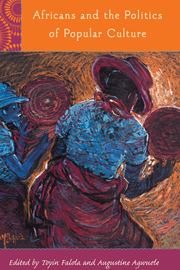Book contents
- Frontmatter
- Contents
- List of Illustrations
- Preface
- Introduction
- 1 From Primitive to Popular Culture: Why Kant Never Made It to Africa
- Part One Politics of Culture in Habitual Customs and Practices
- 2 Popular Culture of Yoruba Kinship Practices
- 3 Justice from Below: Cultural Capital, Local/Global Identity Processes, and Social Change in Eastern Niger
- 4 Popular Culture and the Resolution of Boundary Disputes in the Bamenda Grasslands of Cameroon
- 5 Reverse Mission or Asylum Christianity? A Nigerian Church in Europe
- 6 Performing Pop Tradition in Nigeria: From Yorùbá Bàtá to Bàtá Fújì
- Part Two Politics of Culture in Popular Representations: Films and Performances
- Part Three Politics of Culture in Popular Texts
- List of Contributors
- Index
- Rochester Studies in African History and the Diaspora
4 - Popular Culture and the Resolution of Boundary Disputes in the Bamenda Grasslands of Cameroon
from Part One - Politics of Culture in Habitual Customs and Practices
Published online by Cambridge University Press: 12 September 2012
- Frontmatter
- Contents
- List of Illustrations
- Preface
- Introduction
- 1 From Primitive to Popular Culture: Why Kant Never Made It to Africa
- Part One Politics of Culture in Habitual Customs and Practices
- 2 Popular Culture of Yoruba Kinship Practices
- 3 Justice from Below: Cultural Capital, Local/Global Identity Processes, and Social Change in Eastern Niger
- 4 Popular Culture and the Resolution of Boundary Disputes in the Bamenda Grasslands of Cameroon
- 5 Reverse Mission or Asylum Christianity? A Nigerian Church in Europe
- 6 Performing Pop Tradition in Nigeria: From Yorùbá Bàtá to Bàtá Fújì
- Part Two Politics of Culture in Popular Representations: Films and Performances
- Part Three Politics of Culture in Popular Texts
- List of Contributors
- Index
- Rochester Studies in African History and the Diaspora
Summary
Introduction
The Bamenda Grasslands of Cameroon, former British colonial Bamenda Division, or present-day North-West Province, is one of the ten provinces that make up Cameroon. This region has been variously referred to as the Western Grassfields, Bamenda Grassfields, Bamenda Grasslands, Bamenda Division, Bamenda Province, and North-West Province. It covers a total surface area of roughly 17,409 square kilometers, approximately 3.7 percent of the total surface area of present-day Cameroon. The North-West Province is composed of the former administrative divisions of Bamenda, Wum, and Nkambe, which together made up Bamenda Province, which lasted until the independence of Cameroon in 1961. Four new divisions have been created out of the former three. These are Bui, Momo, Boyo, and Ngoketunjia, with headquarters in Kumbo, Mbengwi, Fundong, and Ndop, respectively.
Migration into the region is relatively recent, taking place just before the advent of colonial rule in the nineteenth century. During the early years of migration, most of the ethnic groups and communities that occupy the Bamenda Grasslands today were involved in frequent wars over control and ownership of land. As a result, neighborly coexistence and the day-to-day activities of these ethnic groups were, for a long time, dominated by an uneasiness that translated into a political calculation aimed at reducing, managing or resolving disputes, especially boundary disputes. These societies were endowed with a rich tradition that enabled them to set appropriate guidelines for the resolution of their numerous boundary and interrelational disputes.
- Type
- Chapter
- Information
- Africans and the Politics of Popular Culture , pp. 84 - 103Publisher: Boydell & BrewerPrint publication year: 2009



